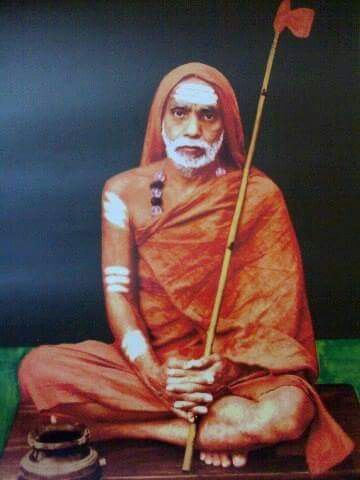Part 1 Kural 33
http://www.kamakoti.org/tamil/part1kural33.htm
Translation by Veeraswamy Krishnaraj
These are the opinions of Mahāperiyava. There are dissenters and
assenters.
Unity in Diversity
 When
I see Varṇa Dharma, it reminds me of airships.
One gas-bag airship, if it sustains damage and a hole, the
airship falls. Now the airship or the dirigible with multiple gas bags
filled with helium will stay afloat though one may be punctured and
deflated. Likewise, in Hindu religion, there are multiple Dharmas. This,
Mahāperiyava calls, Unity in Diversity.
When
I see Varṇa Dharma, it reminds me of airships.
One gas-bag airship, if it sustains damage and a hole, the
airship falls. Now the airship or the dirigible with multiple gas bags
filled with helium will stay afloat though one may be punctured and
deflated. Likewise, in Hindu religion, there are multiple Dharmas. This,
Mahāperiyava calls, Unity in Diversity.
The Twig Forager
It is labor-intensive to collect and tie twigs, sticks and small
branches from the forest floor. The sticks from the bundle may easily
loosen up. When even one little branch is pulled from the bundle ever so
carefully, the bundle gets slack. When two or three are removed, the
bundle becomes very slack and all of them fall out individually or en
masse.
Let us assume we have many small bundles instead of one big bundle. We
can tie up each small bundle compactly and bind all bundles into a big
bundle. The big bundle made of small bundles can remain compact.
Individual twigs or branches will not fall out but stay put in the small
bundles. Likewise, the big bundle will remain intact.
Let us assume the small bundle is not tight and compact. The sticks may
fall out of that bundle, but other bundles will remain intact and
compact. The twigs will not fall out.
It is an impossible proposition to have one huge populace under one
structure or organization. How could such unmanageable society be
brought under control and discipline. That is why the society was
divided into separate individual groups and job-specific hereditary
Jātis. Each Varna was an individual compact bundle: Jātis. Each Jāti had
sovereignty on its own group. Any one breaking the established norms of
that Jāti was punished. The government has jails to punish the felons…
This does not discourage the criminals. The crime keeps growing. The
punishment dealt to the criminals until the beginning 19th
century kept people as law abiders and discouraged them from criminal
activities. The police and
the criminal justice system was not crowded with criminal court cases.
Jāti Praṣṭam
or caste pride was why the elders doled out punishments. Take the
cobbler or the barber. Nowadays, they are called backward or depressed
castes. They felt hurt in the heart to think they may be excommunicated
(because of the new classification). It was an unbearable punishment and
a great shame. What do we learn from this? No Jāti puts down another
Jāti. It appears that persons of an individual Jāti consider themselves
as the kings and feel fulfilled and content. Is it not so? Only when
there are attitudes and opinions of superiority and inferiority, many
kinds of inferiority complex would have risen. Except for Brahmins and
Kṣatriyas, there would not have been among other castes respect for
their caste or Jāti, a sense of dignity, special affiliation…
But in practical terms in the name of Jāti, people remaining in small
communities developed mutual love, loyalty, and bond. That is why
excommunication was a punishment. The backward classes hold on to their
Jātis simply because special privileges are granted to them. They do not
have a heart-felt feeling of pride, dignity, loyalty, and self-respect.
Since there is competition with and resistance to others (within and
outside the Jāti), they entertain no self-respect or a sense of honor.
In the past, there was no inter-caste fights or competition.
Everyone remaining in his Jāti, doing his caste-ordained work,
and observing special rites, injunctions, traditions, customs, and
duties, has a sense of pride, joy, and fulfillment.
The rioters attract the police and engage in fights with them.
In the past, Jāti sovereignty reigned supreme and no one opposed
and fought against it. Nowadays the police are the outside agency
enforcing law and order.
Because of Jāti sovereignty, there was a sense of ‘Our People’ bond,
pride, and caste loyalty.
Without a need for weapon or military power, the erstwhile self-rule of
hoary past saw lesser crimes. Though there was separation by Jāti
(caste), caste-ordained vocation, related customs…, all castes practiced
unity (in diversity).